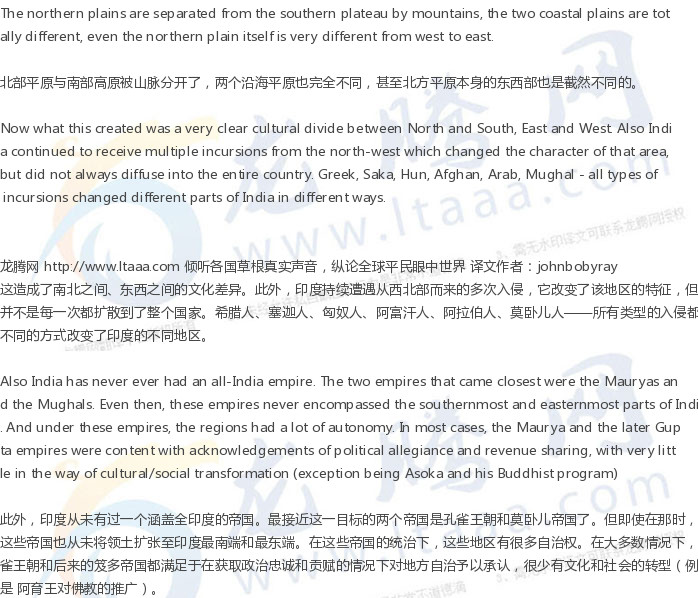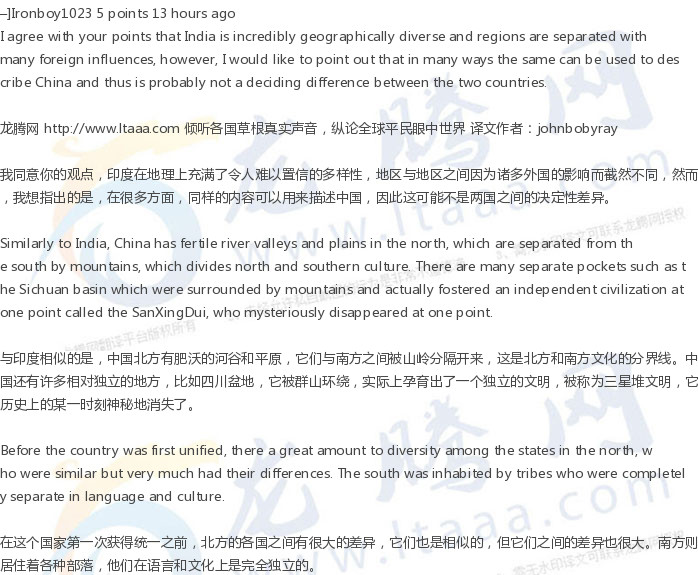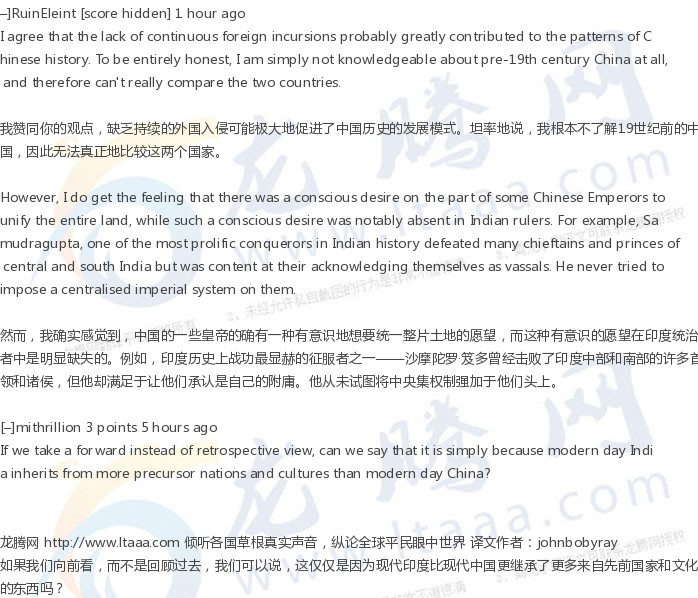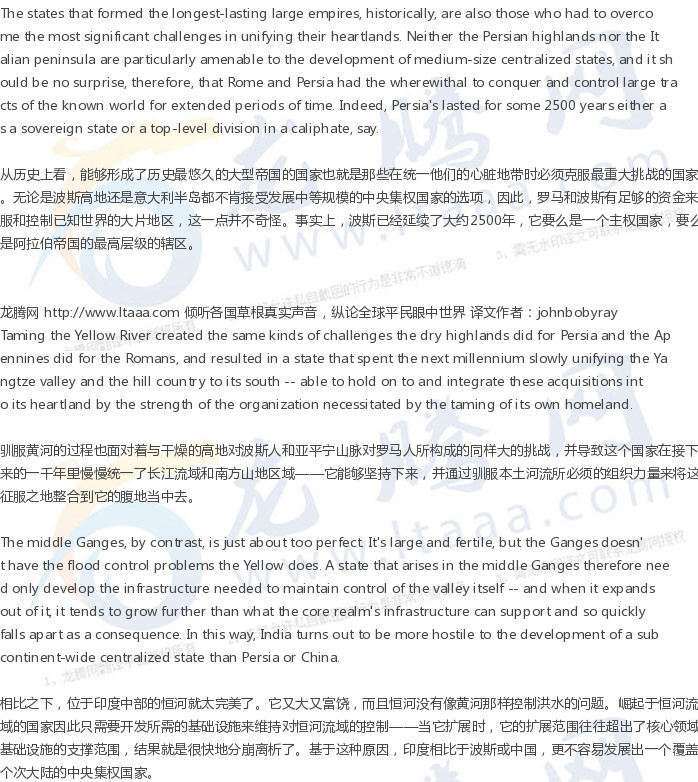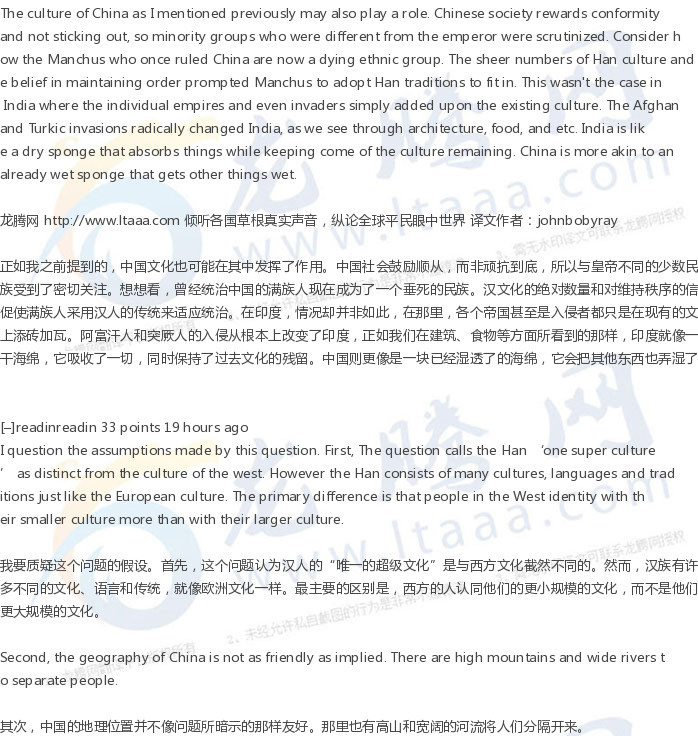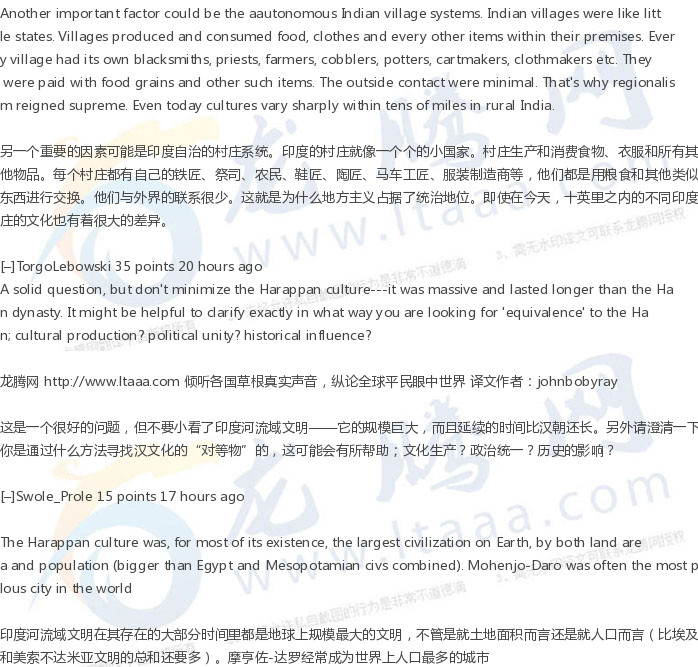为什么印度文化没有像汉文化那样成为主流文化呢?(上) [美国媒体]
我知道中国是如何通过中国化的方式成为一个几乎同质的拥有12亿人口的国家,但是为什么在很多方面都有类似的地形的印度却没有产生了与汉文化相当的成果呢?
Why didn’t an Indian culture emerge as the dominant culture like Han did in China due to Sinicization
为什么印度文化没有像汉文化那样成为主流文化呢?
I’m aware of how China became an almost homogenous nation of 1.2 bn people through Sinicization, but why didn’t India who in many ways shares similar geography produce an equivalent to Han?
我知道中国是如何通过中国化的方式成为一个几乎同质的拥有12亿人口的国家,但是为什么在很多方面都有类似的地形的印度却没有产生了与汉文化相当的成果呢?
I get why in Europe and the Middle East one super culture didnt form to dominate the west, mainly due to The Mediterranean sea, Sahara desert, and Syrian desert. But the Indian subcontinent, like China, isn’t broken up by a massive sea or desert like the west is. As well it had one of the few river valley civilizations and is one of the most fertile places in the world
我明白为什么在欧洲和中东没有产生一个超级文化来主导西方,其主要原因是地中海、撒哈拉沙漠和叙利亚沙漠。但是印度次大陆和中国一样,并没有像西方那样被巨大的海洋或沙漠所破坏。它也拥有为数不多的河谷文明之一,并且还是世界上最富饶的地方之一。
[–]RuinEleint 1650 points 19 hours ago
Hi. I am an Indian, and am currently studying Indian history. You address a rather complex issue.
嗨。我是印度人,目前正在学习印度历史。你提出了一个相当复杂的问题。
The main thing about Indian history is that there is a very significant amount of linguistic, cultural and geographical diversity.
印度历史的主要特点是:这片土地上存在着极其丰富的语言、文化和地域的多样性。
Now, the periods between empires saw long-intense periods of regional autonomy, local conflict and the further emphasis on local identities. India is very good at adopting new norms, while maintaining old ones. Thus, in Bengal, in the 16th to 18th century, while Persian was the acknowledged language of court and administration, the ordinary people used Bengali, and that too was fragmented into many local dialects that literally changed from district to district.
现在,旧帝国灭亡与新帝国建立之间的时期便出现了长期的区域自治、局部冲突和对当地身份认同的进一步强调。印度非常善于采用新的范式,同时也善于保持旧的范式。因此,在16世纪到18世纪的孟加拉,虽然波斯语是公认的宫廷和行政语言,但普通民众使用的却是孟加拉语,而它又在不同地区分化出了许多方言。
There was never a ruler who actually tried to impose one culture, one language and one code of laws. No empire had the stability and the power. The regional diversity was too much.
从来没有一个统治者试图给印度强加一种文化、一种语言和一套法律。没有一个帝国拥有过稳定和权力。地区的多样性太丰富了。
This is not very different to the situation in India during its early years.
这与印度早年的情况没有太大的差别。
I would argue the main reason that China stayed unified was the lack of foreign influences, as you also pointed out. Foreign powers created lasting imprints that exacerbated geographic differences, especially with religion, and made regional rivalries flare up and make any empire which unified the continent difficult to maintain. Overall, India's proximity to other centers of civilizations destabilized the country enough that it could never fully unify.
我认为,中国保持统一的主要原因是缺乏外国的影响,正如你所指出的那样。外国势力创造了持久的印记,加剧了地理上的差异,尤其是伴随着宗教的作用,并使地区间的竞争加剧,使任何统一这片大陆的帝国都难以维系。总的来说,印度与其他文明中心的距离使这个国家变得不稳定,以至于它永远无法完全获得统一。
The history of both modern nations are fairly short compared to the cultural history of the regions respectively. They're wasn't anything like "all Indians belong together" or "all Chinese belong together" before their recent nation-forming. If either region reached modern era in a more divisive period, there could very well be multiple modern nations in their place today. For India it is the Mughal and then British who "forced" all the different peoples into a same superstate, whereas if not for the Manchurian conquest and acquisition of Mongolia, Tibet etc., these regions would likely belong to their own independent states instead of China. Had Ottoman empire survived to this day, it would be comparable to India or China but somewhere in between - with strongly culturally related peoples (through history and religion) that are also very distinct from region to region, and we would be asking similar questions about them.
与这些地区的文化历史相比,现代的这些国家的历史是相当短的。在他们最近形成民族之前,他们根本不是“所有的印度人是一个整体”或“所有中国人是一个整体”这么回事。如果这两个地区在一个更加分裂的时期进入了现代,那么今天在它们的土地上很可能会出现多个现代国家。对印度来说,是莫兀儿和英国人“强迫”所有不同的民族整合成为同一个超级国家,同样的,如果不是满洲人征服和吞并了蒙古、吐蕃等地,这些地区很可能便属于他们自己的独立国家,而不是中国了。如果奥斯曼帝国幸存至今,它将可以与印度或中国相媲美,并介于两者之间——它拥有着文化相关性非常密切的民族(通过历史和宗教),也有着地区和地区的差别,那么我们也会针对他们问出类似的问题。
[–]RuinEleint 3 points 10 hours ago
Asoka actually chose peaceful consolidation and tried to use Buddhism to unify India. He sent missionaries to Sri Lanka, Tibet, China, and I think Greece.
阿育王实际上选择了一种和平的巩固方式,并试图利用佛教来统一印度。他派传教者到斯里兰卡、吐蕃和中国,我想还有希腊。
The issue was never simply invaders through the North West, but also repeated weakness and fragmentation of the indigenous kingdoms. The Guptas actually successfully fought the Huns and this was after their golden age. Chandragupta Maurya defeated Alexander's general Seleucus when he tried to regain Alexander's conquests in India. But at other times, there was simply no united powerful Indian political entity to resist invasion.
这个问题绝不仅仅是通过西北地区进入的侵略者,而且还有不断地重复着的本土王国的软弱和分裂。笈多王朝实际上曾经打败了匈奴人,这甚至是在他们的黄金时代已经结束之后。当旃陀罗笈多试图重新夺回印度被亚历山大征服的土地时,他甚至打败了亚历山大的将军塞琉古。但在其他时候,根本没有强大的印度政治实体来抵御入侵。
[–]hammersklavier 16 points 11 hours ago*
It occurs to me this might actually be -- ironically -- because the middle Ganges valley is too optimal for the development of a centralized state.
在我看来,答案可能是——具有讽刺意味的——因为中间的恒河流域对于一个集权国家的发展而言太过理想了。
See, the Chinese heartland in antiquity was the North China Plain, which is one of the world's largest alluvial plains. This means it is incredibly fertile but also incredibly flat and prone to flooding. The Yellow River has, in fact, changed course between 18 and 26 times in recorded history -- and has reached the sea, at various times, on either side of the Shandong Peninsula. In fact, its mouth changed most recently in the 20th century!
请看,在古代,中国的中心地带是华北平原,它是世界上最大的冲积平原之一。这意味着它非常富饶,而且非常平坦,容易发生洪灾。事实上,黄河在有记载的历史上就改变过18到26次河道,在不同时候,它曾在山东半岛的任何一边奔流入海。事实上,它的入海口在20世纪还发生了改变!
Because of this, centralized states developed early on the North China Plain as an extension of the hydraulic engineering needed to keep the river where it was "supposed" to go and not wreck people's fields after every big rain. These coalesced into the Shang and early Zhou dynasties, fragmented in the Warring States period, and were more-or-less permanently unified by the Qin Dynasty ... However, the nature of the heartland necessitated greater Chinese centralization, just due to the titanic effort needed to (not always successfully) keep the Yellow River in check.
正因为如此,在华北平原上发展起来的早期中央集权的国家便成为了发展使河流保持在它“应该在”的地方,而不是在每次大雨之后就破坏人们的田地的水利工程的延伸产物。这些国家在商周和周朝经历了合并的过程,在战国时期又变得支离破碎,然后又在某种程度上被秦王朝永久性地统一了。然而,中心地带的本质让更大规模的中国中央集权成为必要,这是因为人们需要付出巨大的努力(并非总是成功的)来控制黄河。
If this is the case, then it makes sense why a bunch of Timurid exiles carrying Persian ideas of administration were the ones who formed the longest-lasting unification of India prior to British meddling.
如果是这样的话,那么为什么一群持有波斯观念的帖木儿流亡者在英国干预之前建立了印度最持久的统一帝国,就说得通了。
[–]khoonirobo 50 points 20 hours ago
This! India was really influenced by a multitude of incoming and internally generated influences but never had a truly long period of stability and thus homogenisation. Without the homogenisation part the multitude of cultures continue to exist in pockets and influence each other in broader swathes. An example, take language, the only really common language is English, which is no - ones mother tongue. No language has the status of a 'national language' though there are multitude of nationally recognised languages.
就是这个原因!印度确实受到了许多外来和内部产生的因素的影响,但从未有过真正的长期稳定和同质化的过程。没有了同质化的过程,大量的不同文化继续存在于其中,并在更大范围内相互影响。举个例子,就拿语言来说,唯一真正通用的语言是英语,但它不是母语。没有一种语言具有“民族语言”的地位,尽管存在着大量得到国家认可的语言。
[–]ludonarrator 2 points 14 hours ago
This is (almost) correct; most of present day India is astonishingly isolated from all sides. This is also why the location of Kashmir - which currently happens to be under Indian control (sort of illegally so, too) - is considered extremely valuable, being the centre point of three competing nations in the Himalayas: India, China, and Pakistan, and has been in a state of constant war for several decades now.
你说的(几乎)是正确的;如今的印度大部分地区都与各个方面惊人地相互隔绝。这也是为什么克什米尔的地理位置——目前它由印度控制(在某种程度上是非法的)——被认为是极具价值的,被认为是三个在喜马拉雅山脉地区展开争夺的国家——印度、中国和巴基斯坦——的中心点,几十年来,它一直处于持续的战争状态。
[–]Mequittingthenet [score hidden] an hour ago
India is FAR more geographically bound than China, with an ocean to the south, heavily forested mountains to the east, world's tallest mountains to the north, an arid mountain range to the west, through which South Asia is linked to the rest of the world.
india has access into the silk road. it's oceans to the south exposed it to greek and arab traders since before recorded history. china is landlocked except to the east. india has a whole peninsula exposed to the ocean. also, within india, the land is more broken by rivers and mountains. isolating people within india from each other, whereas within china, people can travel with relative ease.
印度可以接入丝绸之路。在有记录的历史之前,印度南方的海洋将其暴露给了希腊和阿拉伯的贸易商。除开东面,中国可以算是一个内陆国家。印度有一个完整的半岛暴露在海洋当中。此外,在印度国内,土地更多地为河流和山脉所割裂。人们在印度内部陷入了相互孤立的状态,而在中国,人们则可以轻易地进行相互间的交流。
Also sea invasions became popular in the late 1800's, when all the European countries were competing for large navies.
而在19世纪晚期,当所有的欧洲国家都在就海军实力展开竞争的时候,海上入侵也开始流行了起来。
[–]bananagee123 151 points 20 hours ago
The northern and southern parts of India are actually separated by shorter mountain ranges that gave ancient armies a difficult time. That’s part of the reason why south India almost always had its own kingdoms
印度的北部和南部实际上是由较短的山脉分开的,这给古代军队带来了困难。这就是为什么南印度几乎总是拥有自己的王国的部分原因
[–]Netturaan 84 points 20 hours ago
This is an interesting point .I remember a professor once telling us that these historical effects can be seen in the way festivals are celebrated in South and north .Southern festivals are usually "in-house" events and do not have too much of community celebrating together , out in the open etc. , Whereas the North Indian festivals are more community based and obvious (such as navratri dance , or Holi etc.) . Apparently this is due to the fact that since norther parts were historically invaded from time to time and were always under threat , festivities were a show of strength of the communities .
这是一个有趣的观点。我记得有一次,有个教授告诉我们,这些历史影响能够从南方和北方节日的庆祝方式中看出来。印度南方的节日通常是“内部”事件,没有太多的社区一起公开庆祝,而印度北方,节日更多地基于社区 (如九夜节的跳舞,或胡里节等)。很明显,这是因为,由于北方在历史上一直受到侵略,而且总是受到威胁,所以庆祝活动是社区力量的展示。
[–]LD_in_MT 28 points 19 hours ago
mountains
I'll add that China has two large navigable rivers and multiple smaller ones that help unify parts of the interior with the coastal regions.
我要补充的是,中国有两条通航河流和多条较小的河流,它们有助于将内陆地区与沿海地区统一起来。
India certainly has navigable rivers, but nothing that connects the north and the south, say the way the Mississippi river system does in the US.
印度当然也有通航河流,但却没有任何一条连接南北的河流,就如密西西比河系统在美国所发挥的作用。
[–]MFillon 13 points 18 hours ago
Sorry, when I say Chinese identity, I mean it in a loose sense: i.e. that a person living in China at a given time identified himself as a subject of the ruling dynasty rather than of a tribe or a village (and I do understand that not everyone did). From a language standpoint, if I remember correctly, modern Chinese characters were formed post-Shang, and many elements of the culture like architecture and philosophy that would last for centuries to the modern day were set in place by the time of the Han. I would say a Chinese identity (again, in the broadest sense) was strongly in place by the golden age of the Tang.
抱歉,当我说中国人的身份认同的时候,我的意思是:在一个特定的时间里,一个住在中国的人认为自己是统治王朝的臣民,而不是一个部落或一个村庄的成员(我确实理解不是每个人都是这么想的)。从语言的角度来看,如果我没记错的话,现代汉字是在商之后的时期形成的,而它的文化中的许多元素,如建筑和哲学——它们延续了几个世纪,一直到现代——都是在汉代确立的。我想说的是,(从最广泛的意义上来说)中国人的身份认同是在唐朝这个黄金时代被构建出来的。
I'm no professional historian, but I am an avid reader of Chinese history (and have lived in China previously). It's such an amazing subject, Chinese history. But please, take my posts as my own opinion and analysis, not fact.
我不是专业的历史学家,但我是中国历史的热心读者(以前曾在中国生活过)。中国的历史是一个令人惊叹的主题。但请注意,我的帖子仅代表我自己的观点和分析,而不是事实。
[–]DaBIGmeow888 4 points 18 hours ago
Southern China was fully sinicized during the Song/Tang dynasties due to massive migration from Northern China.
There were rivalries between Yue and Hakka in some regions, that's all I know of.
由于来自中国北方的大规模移民,中国南方在唐宋时期被完全地中国化了。
在一些地区,粤人和客家人之间存在着竞争,这就是我所知道的。
[–]sf_davie 17 points 18 hours ago
Before the Mongols, there were significant periods of time where the place we call China today was split into many states. China was only really a unified entity for about 4 dynasties and they are often followed by centuries of turmoil (See Spring-Autumn after the Chou, Warring States before the Qin, Three Kingdoms and North and Southern Dynasties in between of Han Tang, and not to mention the drawn out instability of the later Song) . The people in the central plains were under constant invasion threats. That's why they build walls and developed archery.
在蒙古人之前,有很长一段时间,我们称之为中国的这片土地分裂成了许多国家。中国只有在大约四个王朝时期形成了一个统一的实体,而后往往就是几个世纪的动荡(周之后的春秋时期,秦朝之前的战国时期,汉朝和唐朝之间的三国时期和南北朝时期,和更不用说后来不稳定的宋朝了)。中原地区的人民受到不断的侵略威胁。这就是他们修建城墙和发展箭术的原因。
[–]Sikindar[🍰] 39 points 19 hours ago
I believe the heterogeneous view of India came forth due to a mixture of several factors.
我相信印度存在差异的观点是由几个因素混合导致的。
For example, when one observes Northern India you see a sense of homogeneity and a similarity in the culture which can be attributed to the Ganges water system which is shared throughout the north. This led to trade and the spreading of culture throughout Northern India. India is often underrated in terms of its size but when you look through its geography you see dense jungles with numerous mountain ranges, rivers, deserts and highlands which helped to isolate different people groups, not within the Ganges water system.
例如,当你观察印度北部时,你会产生一种同质化的感觉,在这一地区,文化中有相似之处,这可以归因于整个北方的恒河流域。它导致了整个印度北部的贸易和文化的传播。印度的规模经常被低估,但当你从它的地形上来看时,你会看到茂密的丛林、无数的山脉、河流、沙漠和高地,这有助于隔离处于恒河流域之外的不同的人群。
Also, the unification of India was not as frequent as in China, as only a couple of times had mostly India been united, namely: the Mauryan Empire, Delhi Sultanate, Mughal Empire, Maratha Empire, British Raj. The unification of culture is due in part to a centralized state which was commonplace in Chinese society along with strong Confucian values that encouraged integration with society.
此外,印度的统一并不像中国那样频繁地发生,因为印度只有几次是统一的,即:孔雀王朝、德里苏丹国、莫兀儿帝国、马拉地帝国、英国统治时期。文化上的统一在一定程度上是由于中国社会中司空见惯的中央集权国家,以及鼓励与社会融合的儒家价值观。
[–]Eric1491625 [score hidden] 1 hour ago
There are indeed high mountains in China but the central plains between the Yangtze and yellow river are remarkably flat, and half the population lives there. The mountainous areas are mostly in the southwest and far west, but hardly anyone lives there. Precisely because the geography is rough there the population densities are low and as a result the Tibetans/uighurs/Min living in those mountains/deserts are utterly outnumbered by the Han who come from the large plains.
中国确实有高山,但长江和黄河之间的中原地带却非常平坦,中国一半的人口都住在那里。山区大多位于西南部和西部,但几乎没有人住在那里。正因为地理位置不太好,那里的人口密度很低,因此,居住在这些山区和沙漠中的各个民族的人口远远少于居住在大平原的汉人的人口。
[–]bikbar 15 points 18 hours ago
As others have mentioned before, lack of a unifying empire was the main reason for not having a pan-Indian culture like China. The great empires of the Mouryans or the Mughals were not that centralized too.
正如其他人之前提到的,缺乏统一的帝国是印度没有出现像中国那样的泛印度文化的主要原因。孔雀王朝或莫卧儿帝国这样的大帝国也不是那么中央集权的。
The Indian empires were more like a federation of semi-independent states. For example, even during the Mughal empire at its zenith the subahs (provinces) like Bengal or Golkonda were mostly independent. The badsah of Delhi had almost zero influence in the faraway cities and villages.
印度的帝国更像是一个半独立的国家联盟。例如,即使是在莫卧儿帝国的全盛时期,像孟加拉或戈尔康达这样的省份也大多是独立的。德里政府在遥远的城市和村庄几乎没有影响力。
[–]alter_pro[S] 11 points 20 hours ago
When I say Han I mean in the same context as in when someone says “I am Spanish, Not Catalonian” or “I am Scottish, not English”. So I would say Political unity that would be nationalistic in nature. I realize that someone in Guangzhuo lives a very different life and has vastly different customs to someone in Beijing, however both these people call them self. A culture so far as someone can say “I am (x nationality)” even if they have very different customs in practice. Kind of like Bavaria in Germany, Bavarians are catholic vs prot and a very distinct people but still are considered Germans
当我说汉的时候,我的意思就和有人说“我是西班牙人,不是加泰罗尼亚人”或者“我是苏格兰人,不是英国人”是一样的。所以我想说的是,政治上的团结在本质上是民族主义的。我意识到,广州人和北京人的生活非常不同,他们有着截然不同的习俗,然而这两个人都叫他们自己。一个人可以说“我是某国人”,即使他们实际上有非常不同的风俗习惯。就像德国的巴伐利亚一样,巴伐利亚人信奉天主教,反对新教,虽然他们是一个非常独特的民族,但仍然被认为是德国人
[–]Lord_Malgus 7 points 18 hours ago
Jokes aside, "Spain" was actually a bunch of feudal states up until the 15th century when it unified between the three major regions; Leon (Galician/Castilian), Castile and Aragon (Catalan), it was a really volatile "empire" that would only really solidify in the 1700s. Today there's the "autonomous system", but we've seen what happens when one of the regions tries to gain actual autonomy.
撇开笑话不谈,“西班牙”实际上是一群封建国家的组合,直到15世纪,它统一了三个主要地区:利昂地区(加勒西和卡斯蒂利亚),卡斯提尔和阿拉贡(加泰罗尼亚),它是一个非常不稳定的“帝国”,只有到了18世纪才真正固化。今天西班牙实施一种“自治制度”,但是我们已经看到了当一个地区试图获得真正的自治权时会发生什么。
[–]readinreadin 4 points 19 hours ago
When did people in the Chinese empire first start calling themselves ‘Han’? I suspect if you can find out when that happened it will go a long way toward answering the question of why so many people of different but related cultures use the term but similarly inclusive terms like ‘European’ are less commonly used for culture.
中华帝国的居民是什么时候开始称自己为“汉族人”的?我怀疑,如果你能发现这一切发生的时间,它是否将会在很大程度上回答为什么这么多不同但相关文化的人使用这个词,但类似于“欧洲人”这样的包容性术语在文化中已经不太常用到了。
[–]Hellebras 5 points 17 hours ago
During or after the Han dynasty. The Han were a long-lasting dynasty that controlled pretty much all of China to some extent or another, along with some territory outside of it. The Han also presided over one of the golden ages of Chinese civilization. So this contributed to the conditions that allowed for the development of a central identity.
在汉朝存在的时候或之后开始使用的。汉朝是一个长命的王朝,它在一定程度上控制了中国的大部分地区,以及域外的一些领土。汉朝还是中国文明的黄金时代。因此,这促成了一种允许发展中心身份认同的条件。
[–]Swole_Prole 7 points 14 hours ago
Do you think their very advanced city infrastructure, including by far the oldest and most advanced pre-modern sewage system, arose without any political organization at all? That seems very naive. They were the first civilization to standardize measurements too. Obviously this was a very organized society at every level.
你认为他们有非常先进的城市基础设施——包括迄今为止最古老、最先进的前现代时期的污水处理系统,但却压根没有任何政治组织吗?这么想看起来很天真。他们也是第一个标准化度量衡的文明。很明显,这是一个非常有组织的社会。
[–]sbzp -3 points 14 hours ago
Then why is there no direct evidence of political organization? There should've been some obvious evidence of that. It's highly possible they weren't a civilization but something completely decentralized, which on its own is very impressive but again creates an apples to oranges comparison.
那么为什么没有政治组织存在的直接证据呢?应该有一些明显的证据存在的。很有可能他们不是一个文明,而是一个完全松散的集合,这本身就很令人印象深刻,但你们又要拿苹果和橙子进行比较。
[–]Swole_Prole 7 points 13 hours ago
They were by far the most expansive and populous civilization for most of ancient history. How could that be achieved with no political organization? What would evidence look like, considering we have not deciphered the Indus Script, and are not even sure it is a script? Why would they all have such similar city organization? Obviously there is a lot we don’t know, but it simply makes no sense to imply they were just villages doing their own thing. Where else on Earth have poorly organized societies ever produced such an advanced civilization?
在古代历史上,他们是迄今为止面积最广阔、人口最多的文明。在没有政治组织的情况下,这怎么能实现呢?考虑到我们还没有破译古印度河流域的文字,甚至不确定它是否是一个文本,证据会是什么样子呢?为什么他们都有类似的城市组织?很明显,有很多我们不知道的事情,但是认为他们只是各行其是的村庄,这是毫无意义的。在地球上其他社会组织性这么差的地方是否曾经产生过这样一个先进的文明呢?
[–]sachinabilliondreams 0 points 17 hours ago
India for a long part of history had city state like the Greeks but on a very large scale. The Mauryas brought it under the control of an Empire. I am seeing that people are calling Mauryas as just titular heads who were content to let local kings rule in there stead. This is incorrect as the Mauryas had a unified army, administration which was centralised. They had a common currency and regional governors. Why India didn't develop into a homogeneous society is mainly because non was powerful enough to overthrow the other and each region maintained its uniqueness simply because everyone had huge numbers which couldn't be completely suppressed. Also China had a lot of diversity and the totalitarian state destroyed it .
印度在历史上很长一段时间里都有像希腊这样的城邦,但它的规模大得多。孔雀王朝把它置于一个帝国的控制之下。我看到人们把孔雀王朝的皇帝称为是满足于让土邦王公统治当地的名义上的统治者。这是不正确的,因为孔雀王朝有一支统一的军队,它管理是集中的。他们有一种共同的货币和地方长官。为什么印度没有发展成一个同质的社会,主要是因为没有强大到足以推翻另一个社会的力量,每个地区都保持着它的独特性,因为每个方的人数都很多,无法被完全压制住。中国也有很多多样性,而极权主义国家已经摧毁了它。
[–]Demiansky 5 points 12 hours ago*
I would say that the main reason is the same reason Latin isn't the dominant culture in Europe (but nearly was). Maintaining imperial hegemony over India or the Mediterranean for an extended period of time was harder than it was for China due to geography and the relative locations of high population carrying capacity. India's Ganges and and Ganges delta has huge carrying capacity, but is wedged up in the corner of the subcontinent. In other words, dominating all of India long enough to enforce one culture over all of India meant projecting power from a much more distant power base across many more mountains, deserts. Also, a large population base south and West of the plateaus meant powerful, "civilized" rivals to any Northern entity (not to mention over in modern day Pakistan, separated by even more natural barriers.)
我想说的是,主要的原因和拉丁文化不是欧洲的主流文化是一样的(它过去曾经是)。由于地理条件和能够承载相对较多人口的区位因素,在很长一段时间内维持对印度或地中海的掌控的帝国霸权比在中国更难。印度的恒河和恒河三角洲拥有巨大的人口承载能力,但却被挤到了印度次大陆的角落里。换句话说,要统治整个印度足够长的时间——从而足以在整个印度推行一种文化,意味着要翻越更多的山脉和沙漠,将力量投射到更遥远的地方去。此外,高原南部和西部的人口基数也很大,这意味着它也是强大的、“文明的”竞争对手(更不用说在现代巴基斯坦了,它被更多的自然障碍隔开了)。
Given enough time consistently United under one political entity, one dominant culture evolved. The same thing started happening in the Roman Empire with Latin culture, but the process was interrupted.
只要有足够的时间在一个政治实体下实现统一,一个主流文化就会进化。同样的事情也发生在罗马帝国的拉丁文化中,但是这个过程被打断了。
EDIT: I worked on a pretty complex historical demography program which gave me a lot of insight into the subject.
编辑:我参与过一个相当复杂的历史人口学项目,这让我对这个问题有了很多了解。
版权声明
我们致力于传递世界各地老百姓最真实、最直接、最详尽的对中国的看法
【版权与免责声明】如发现内容存在版权问题,烦请提供相关信息发邮件,
我们将及时沟通与处理。本站内容除非来源注明五毛网,否则均为网友转载,涉及言论、版权与本站无关。
本文仅代表作者观点,不代表本站立场。
本文来自网络,如有侵权及时联系本网站。
图文文章RECOMMEND
热门文章HOT NEWS
-
1
Why do most people who have a positive view of China have been to ...
- 2
- 3
- 4
- 5
- 6
- 7
- 8
- 9
- 10
推荐文章HOT NEWS
-
1
Why do most people who have a positive view of China have been to ...
- 2
- 3
- 4
- 5
- 6
- 7
- 8
- 9
- 10

